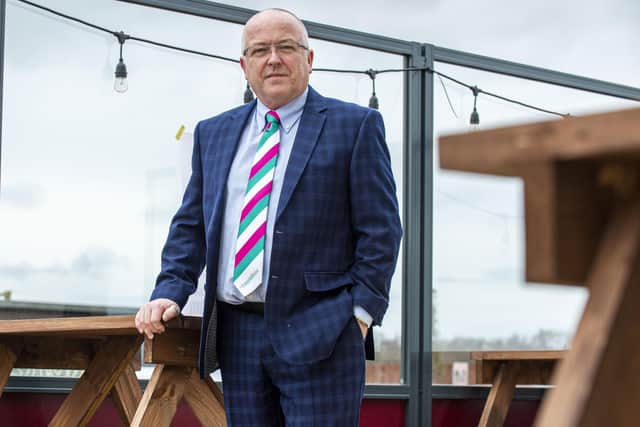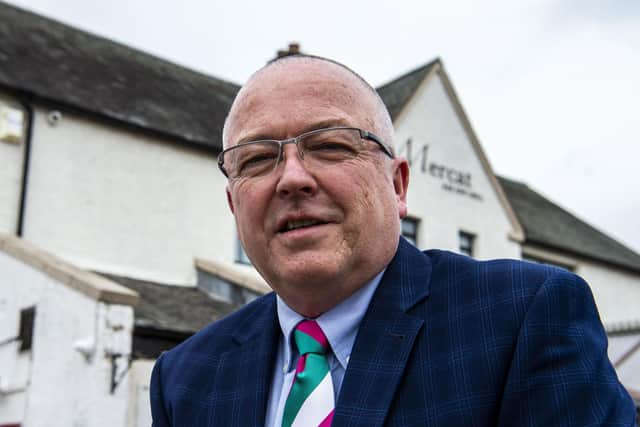The Big Interview: Scottish Licensed Trade Association MD Colin Wilkinson
and live on Freeview channel 276
Mr Wilkinson’s career began in civil engineering, and he joined the SLTA about 40 years ago as a temporary “stop-gap” position. He became secretary in 1999, was promoted to his current role in 2018, and has been vocal about the severe impact of the pandemic on the industry. For example, he recently spoke on behalf of the Edinburgh-based organisation, which was founded in 1880 – when it was among five hospitality trade bodies urging the Scottish government to alter its levels system of lockdown.
Can you explain what the SLTA’s remit and aims are and how your role fits into this?
Advertisement
Hide AdAdvertisement
Hide AdThe SLTA’s remit and key aims are trade protection (to protect and promote the interests of licensee members and their staff), trade development (to promote and encourage training to ensure best practice), and trade liaison (to drive engagement with the 30,000 personal licence holders within Scotland and provide an avenue for the government to connect with all those involved in Scotland’s on-trade).


With everyone’s focus on the pandemic over the last year and now the route map out of lockdown, it is easy to forget the many other significant issues that will resurface: the deposit return scheme, commercial rates, Brexit, taxation (to pay for the pandemic) and many more.
The SLTA’s main focus will be to guide our members and carve a pathway through the difficult times ahead. My role in this will be to draw and collate from the experiences and professional expertise of the association’s council members, who are also operators in the various business sectors in the on-trade, and other stakeholders within our group, to provide our route map on the best way ahead for our industry.
The SLTA recently deemed Chancellor Rishi Sunak’s Budget a “game of two halves” for the licensed trade and hospitality industry – can you give more detail on your thoughts on the Budget’s impact on the industry?
Advertisement
Hide AdAdvertisement
Hide AdIt was a game of two halves – good news in the short term but not such a sunny longer-term outlook. The extension of the current furlough arrangement was a lifeline to the industry, otherwise significant job losses were on the cards. However, there were still significant ongoing general costs for businesses and with employee contributions required by employers from July, businesses will again need to reflect on their ability to maintain staff.


If the industry still has to operate under restrictions, particularly social distancing measures/capacity and operating hours, the ability for all staff to return to their jobs will be hindered. The industry is already facing overburdened financial hardship and we had hoped the furlough scheme would be extended well into 2022.
Confirmation that the VAT rate for hospitality businesses was to be maintained at a reduced 5 per cent rate until September was indeed excellent news –but then rising, returning to 20 per cent in April 2022 meant it was only a temporary fix.
The UK is one of very few countries in Europe that has 20 per cent VAT for hospitality businesses. As we try to rebuild our industry, we really need VAT to remain at 5 per cent permanently if we are to attract tourists.
Advertisement
Hide AdAdvertisement
Hide AdThe freeze on alcohol duty levels and fuel duty were obviously welcomed but in respect of alcohol duty, a freeze or even a reduction doesn’t help the individual pub or bar operator. The whole issue, again higher than our European neighbours, needs to be reassessed.
You have described the licensed trade industry as “battered and bruised”. How would you categorise the way it has been treated over the course of the pandemic by the UK and Scottish governments – and the discrepancy between the two?
The hospitality sector has been specifically targeted with, in our view, over-restricted measures by both governments in comparison with other sectors. As for the so-called four-nations approach, that has been farcical to say the least as each nation has followed its own path.
Our industry’s wounds will take a long time to heal – and while government financial support has been welcome, it has fallen short. On average, our SME members’ ongoing costs while closed have been about £11,000 per month and a typical small hospitality business has already taken on between £60,000 and £90,000 in bank debt and deferred bills as of February – and that debt continues to grow.
Advertisement
Hide AdAdvertisement
Hide AdTwo of the main barriers for the successful rebuilding of our industry are social distancing/capacity and operating hours restrictions. While there is a glimmer of hope on operating hours, the slight lifting of restrictions did not go far enough and very few premises indeed will find it viable to open on April 26.
As we progress down the route map, these restrictions will reduce. However, in respect of the restrictions on social distancing these, I fear, will be with us for some time yet. The rebuilding of our sector is a hurdle at which many will fall.
Despite the fact that there is no evidence that the hospitality sector is a direct causal route of transmissions, both governments have introduced policies based on assumptions and probabilities. Please show us the “data” often cited and it might be a bit easier to swallow the bitter pill of restrictions that our industry is burdened with.
Has the government listened to us? I would say they have. Have they taken our concerns on board? The fact that one year later our sector will still have greater restrictions than many others suggests we continue to be the sacrificial lamb in all of this – which might have been more bearable had realistic financial support been there.
Advertisement
Hide AdAdvertisement
Hide AdAs normal life hopefully starts to resume in the next few months, what is the outlook for the industry and how many casualties will there be?
The hospitality trade has always been resilient and innovative. While we all hope the turnaround from Covid will be as short as possible, the sector can’t recover with one hand tied behind its back in the form of longer-term restrictions.
I am confident that, in time, the outlook for our pubs and bars will be a positive one with people desperate to again encounter the pub/bar experience.
Industry figures are suggesting that there are around 200 pubs and bars that won’t open again at this point, but the true figure will only be revealed further down the line when debt and deferred bills need to be paid.
Advertisement
Hide AdAdvertisement
Hide AdDo you think consumers now appreciate pubs and related venues more due to lockdowns? What is your view on how crucial they are in communities?
You never truly appreciate something until you can’t have it and I think this particularly relates to the hospitality sector, which has been closed for the greater part of the pandemic. The overall experience when visiting Scotland’s pubs and bars and other hospitality venues plays a key part in our everyday lives – and can’t be replaced with virtual alternatives.
The role the “local” plays in our communities cannot be underestimated. Supporting local initiatives/groups/charities and providing, for many, the only social contact they have, the pub or bar is more than just a hostelry.
Let’s also not forget that 71 per cent of visitors to Scotland spend time at our pubs and bars – that’s more than Edinburgh Castle or Britannia or any other attraction on the tourist trail. Our pubs and bars are crucial for the country’s economic revival.
Advertisement
Hide AdAdvertisement
Hide AdYou joined the SLTA about 40 years ago – what has kept you in the industry for so long, how did your ascent through the organisation progress and what have been the biggest changes to the industry in that time?
Working in a “social” industry is very rewarding on many levels and does bring some challenges. However, many problems were resolved at the bar, rather than at actual meetings. The licensed trade has had, and continues to some extent to have, more “colourful characters” than any other. There were also many memorable characters from the other side of the industry, the supply chain, and I got to meet a lot of them in my time at the SLTA at many extravagant social events. We were all more of a family group than business competitors.
As for my progression through the organisation, I simply served a very long “apprenticeship” under my mentor and boss until he thought I had done enough to qualify for his job and he could retire. He became a family friend and was very supportive.
As for the biggest changes to the industry, it is unrecognisable from the last century, and has become far more professional in its approach to all things with the emphasis on training and excellent customer service. The variety of products now available and the diversity of business models offering an array of experiences has propelled the industry to one of Scotland’s leading “must do” attractions.
Advertisement
Hide AdAdvertisement
Hide AdIf we look to March 2022 – two years after lockdown was introduced – what would you like the licensed trade industry to look like then?
To be blunt, at least getting back on its feet but, in my opinion, it’s going to take a lot longer than just a year to achieve some form of return to normality. I would also like the hospitality industry to be given the recognition it truly deserves within the overall tourism sector. Without it, where would our visitors enjoy Scotland’s larder and experience our hospitality heritage?
A message from the Editor:
Thank you for reading this article. We're more reliant on your support than ever as the shift in consumer habits brought about by coronavirus impacts our advertisers.
If you haven't already, please consider supporting our trusted, fact-checked journalism by taking out a digital subscription.
Comment Guidelines
National World encourages reader discussion on our stories. User feedback, insights and back-and-forth exchanges add a rich layer of context to reporting. Please review our Community Guidelines before commenting.